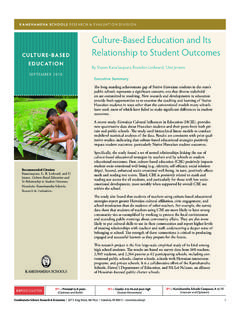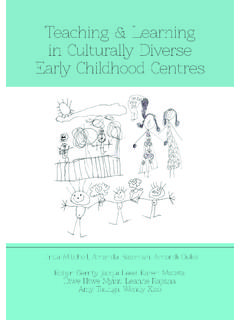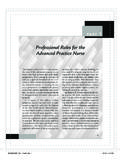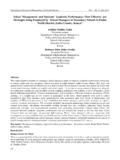Transcription of An Analysis of the Free Pre-School Year in Early …
1 An Analysis of the Free Pre-School Year in Early childhood Care and Education (ECCE) scheme from a Practitioner s Perspective Dr. Gerardine Neylon Department of Politics and Public Administration University of Limerick 2 International Conference on Engaging pedagogy 2012 (ICEP12) ITB, Dublin, Ireland, December 14, 2012 ICEP12 1. Abstract Irish Pre-School provision is undergoing changes in policy and pedagogy as a result of the introduction of the Free Pre-School Year in Early childhood Care and Education (ECCE) scheme (January 2010). This shift to universal Pre-School provision explicitly acknowledges a vast body of research that argues investment in quality Early childhood education is vital.
2 Investment needs to rise in the so-called Dora the Explorer years of Early childhood relative to the so-called Facebook years of later childhood (Organisation for Economic Co-operation and Development, 2009). Irish Pre-School services have been provided by competing sectors across; the private sector, commercial, community based and the state sector. Attendance fees, staff pay-rates and pedagogical approaches were not uniform. This market-led approach has been contested from a children s rights perspective as it did not ensure equality of access to quality Pre-School services for all young children (Hayes, 2005). The new scheme radically changes both employment and pedagogical practices. Now pre-schools are contracted by the Minister for Children and Youth Affairs (MCYA).
3 Acceptance on the scheme is contingent on agreeing to implement new pedagogical quality and curriculum frameworks S olta; the Early childhood Quality Framework, (Centre Early childhood Development Education, 2006) and Aistear; the Early childhood Curriculum Framework, (National Council for Curriculum and Assessment, 2009). This paper describes the scheme and sets out the rationale used by the state in making the change. The paper reports on a phenomenological study which captures the response of sixteen Pre-School practitioners to the scheme. It argues that competing sectors have been affected in a different ways by the change. Keywords Keyword 1, Education 2, Pre-School , 3, Phenomenology, 4, Aistear 5, S olta 3 International Conference on Engaging pedagogy 2012 (ICEP12) ITB, Dublin, Ireland, December 14, 2012 ICEP12 1.
4 Introduction - The Early childhood Care and Education (ECCE) scheme The new ECCE scheme directly pays pre-schools to provide a place for one year per child between the ages of 3 years 3 months and 4 years 6 months at September 1st each year at a weekly rate of A higher rate ( ) is available as an incentive to encourage graduates with a relevant third level degree in Early childhood to work in the sector. Certain stipulations for entry into the scheme apply such as agreeing to implement the new Early childhood curriculum Aistear (National Council for Curriculum and Assessment, 2009) and S olta (Center Early childhood Development Education, 2006). Compliance with regulatory issues such as notification to the Health Service Executive (HSE) and Tax Clearance certificates are required.
5 Pre-schools participating in the scheme were given until September 2012, to hold a nationally accredited major award at Level 5 on the National Framework of Qualifications (NFQ) (or equivalent) in childcare/ Early childhood care and education. The scheme replaced The Early childhood Supplement (ECS), which was a direct payment to families with children under 5 years of age. Under the ECS parents had the choice as to how to spend the 1,000 annual supplement. The payment of the supplement by the state directly to parents did not guarantee that children of Pre-School age would attend Pre-School services. 2. Why invest in Pre-School ? Ireland s change in investment in Pre-School services can be seen as a response to the findings of The Childcare Transition - A league table of Early childhood Education and Care in Economically Advanced Countries (UNICEF, 2008).
6 The report evaluated and compared ten Early childhood Education and Care standards in 25 OECD countries. Ireland s performance was dismal, achieving only one standard. The report found that most European governments already guarantee a Pre-School place to all four year olds and 80% of all staff were trained (UNICEF, 2008, ). The annual Irish competitiveness report of the same year revealed that the number of children of three years of age attending pre-primary education programmes was less than 5%. Both reports agreed in principle that pre-primary education rather than childcare is found to have significant individual and social return (Forf s 2008, ). It was 4 International Conference on Engaging pedagogy 2012 (ICEP12) ITB, Dublin, Ireland, December 14, 2012 ICEP12 clear from an Irish perspective that action to improve the results was a matter of urgency.
7 International longitudinal research has established the value quality Pre-School provision. The HighScope Perry Preschool Project in the Ypsilanti Public Schools in Michigan argues the financial sense in directing support to Early year s services. This research showed that less money is required to finance family, social and remedial educational support in the teenage and later years (Schweinhart and Weikart, 1997). Heckman, advocates for increased investment in young children as set out in Figure below. Table example of return of investment in young children Heckman shows the rate of return to investment in educational and developmental resources to be much higher for children aged 0-5 than at a later stage.
8 The development of a child s skills builds on skills developed previously. In children s earliest years, they develop essential skills or dispositions, such as self-control, interest and determination skills that are both important in themselves and that help children make the most of their later education. 3. Operational and Pedagogical issues in Irish Pre-School Provision 5 International Conference on Engaging pedagogy 2012 (ICEP12) ITB, Dublin, Ireland, December 14, 2012 ICEP12 Up to the introduction of the scheme Pre-School services were funded through a combination of both grant aid and parent s contributions. The introduction of new direct Pre-School payments and new pedagogical approaches had to be applied across: community, private, state and commercial pre-schools.
9 The scheme now operates locally and is managed by the City and County Childcare Committees (CCC s). Currently 96% of eligible children partake in the scheme (about 65,000 Pre-School children). In terms of pedagogical approaches the variety of pedagogies in use included Montessori, Steiner-Waldorf, Na onra (Irish language groups) HighScope and Play based Groups. In order to agree one national pedagogical approach the variety of existing Pre-School approaches (Montessori, Steiner, Play based and Na onra) had to be honoured. This has been achieved by the development of national overarching quality and curriculum frameworks S olta (CECED, 2006) and Aistear (NCCA, 2009). They expertly use interconnected themes Well-being, Identity and Belonging, Communicating and Exploring and Thinking, to facilitate the established pedagogies to operate within the broad frameworks.
10 Training in S olta and Aistear builds on the traditional pedagogical approaches and through exploring the interconnected themes instil post-modern relational pedagogy and rights based approaches into practice. The rationale for the state s structured investment in Pre-School education (ECCE scheme) is an attempt to address the results published in The Childcare Transition - A league table of Early childhood Education and Care in Economically Advanced Countries (UNICEF 2008). Since the implementation of the ECCE scheme Ireland is now on its way to reaching two more standards as set out in the UNICEF league table (universal Pre-School access and trained Pre-School staff). Beyond these measures further standards will be reached as trained and experienced graduates in Early Education continue to be incentivised to work in the sector.







